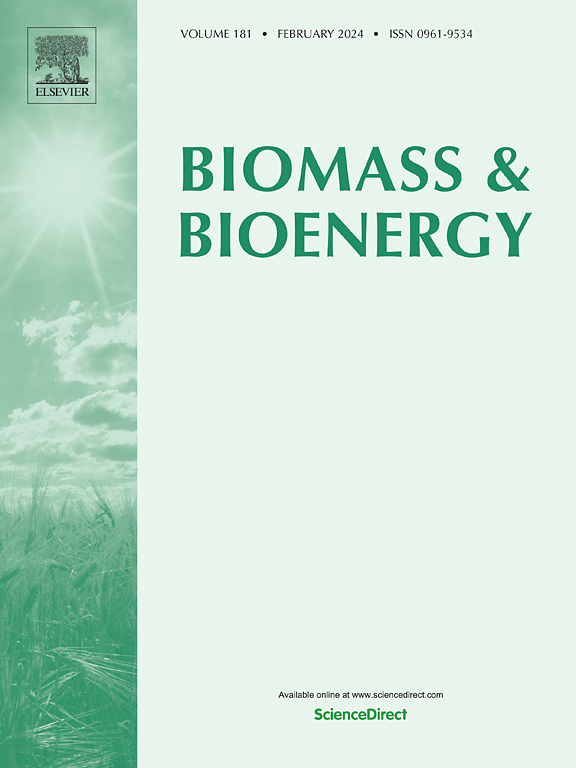台湾可持续发展之生物质能:技术、政策与未来展望
IF 5.8
2区 生物学
Q1 AGRICULTURAL ENGINEERING
引用次数: 0
摘要
本文介绍了台湾的生物质资源。以农业和城市固体废弃物为重点,探讨生物质能的影响,以加强台湾的可再生能源生产能力。生物化学转化技术的进展,如厌氧消化和气化,将废物转化为生物能源,如生物燃料和有价值的副产品(如生物炭和有机肥料)进行全面评估。讨论了中国政府在生物质资源的现状和挑战、潜在的经济和环境进步以及相关政策方面所做的努力。2020年,台湾的生物能源装机容量为716兆瓦,预计到2025年将达到813兆瓦。现代系统对新兴生物质资源的影响对于减少环境影响至关重要。这些系统可以通过整合物联网和人工智能等创新技术来提高经济效率并防止污染。值得注意的是,政策驱动的生物质固体可再生燃料推广和智能农业管理显著有助于台湾向更可持续的生物质能源转型。本文章由计算机程序翻译,如有差异,请以英文原文为准。

Biomass energy for a sustainable Taiwan: Technologies, policies, and future prospects
This review introduces biomass resources in Taiwan. By focusing on agricultural and municipal solid waste, the impact of biomass energy is explored to strengthen renewable energy production capacity in Taiwan. The progress in biochemical conversion technologies such as anaerobic digestion and gasification that transform waste into bioenergy like biofuels and valuable by-products (e.g., biochar and organic fertilizers) is comprehensively assessed. In particular, the government of Taiwan supports green energy production industries and other research units to develop efficient bioenergy by utilizing abundant biomass resources. The government's endeavors related to status and challenges in biomass resources, potential economic and environmental advances, and policies are discussed. In 2020, the installed bioenergy capacity of Taiwan was 716 MW, which is expected to be 813 MW by 2025. The impact of modern systems on emerging biomass resources is pivotal for reducing the environmental influence. These systems can improve economic efficiencies and prevent pollution by integrating innovative technologies like the Internet of Things and Artificial Intelligence. Notably, the policy-driven promotion of biomass-based solid renewable fuels and smart agriculture management prominently contribute to Taiwan's transition towards more sustainable biomass energy.
求助全文
通过发布文献求助,成功后即可免费获取论文全文。
去求助
来源期刊

Biomass & Bioenergy
工程技术-能源与燃料
CiteScore
11.50
自引率
3.30%
发文量
258
审稿时长
60 days
期刊介绍:
Biomass & Bioenergy is an international journal publishing original research papers and short communications, review articles and case studies on biological resources, chemical and biological processes, and biomass products for new renewable sources of energy and materials.
The scope of the journal extends to the environmental, management and economic aspects of biomass and bioenergy.
Key areas covered by the journal:
• Biomass: sources, energy crop production processes, genetic improvements, composition. Please note that research on these biomass subjects must be linked directly to bioenergy generation.
• Biological Residues: residues/rests from agricultural production, forestry and plantations (palm, sugar etc), processing industries, and municipal sources (MSW). Papers on the use of biomass residues through innovative processes/technological novelty and/or consideration of feedstock/system sustainability (or unsustainability) are welcomed. However waste treatment processes and pollution control or mitigation which are only tangentially related to bioenergy are not in the scope of the journal, as they are more suited to publications in the environmental arena. Papers that describe conventional waste streams (ie well described in existing literature) that do not empirically address ''new'' added value from the process are not suitable for submission to the journal.
• Bioenergy Processes: fermentations, thermochemical conversions, liquid and gaseous fuels, and petrochemical substitutes
• Bioenergy Utilization: direct combustion, gasification, electricity production, chemical processes, and by-product remediation
• Biomass and the Environment: carbon cycle, the net energy efficiency of bioenergy systems, assessment of sustainability, and biodiversity issues.
 求助内容:
求助内容: 应助结果提醒方式:
应助结果提醒方式:


